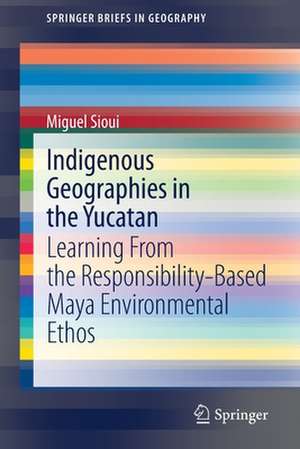Indigenous Geographies in the Yucatan: Learning From the Responsibility-Based Maya Environmental Ethos: SpringerBriefs in Geography
Autor Miguel Siouien Limba Engleză Paperback – 26 ian 2021
Din seria SpringerBriefs in Geography
-
 Preț: 377.18 lei
Preț: 377.18 lei -
 Preț: 380.25 lei
Preț: 380.25 lei -
 Preț: 380.63 lei
Preț: 380.63 lei -
 Preț: 411.32 lei
Preț: 411.32 lei -
 Preț: 379.09 lei
Preț: 379.09 lei -
 Preț: 381.98 lei
Preț: 381.98 lei -
 Preț: 381.98 lei
Preț: 381.98 lei -
 Preț: 376.22 lei
Preț: 376.22 lei -
 Preț: 314.59 lei
Preț: 314.59 lei -
 Preț: 340.12 lei
Preț: 340.12 lei - 15%
 Preț: 469.09 lei
Preț: 469.09 lei -
 Preț: 376.22 lei
Preț: 376.22 lei -
 Preț: 345.52 lei
Preț: 345.52 lei -
 Preț: 377.35 lei
Preț: 377.35 lei -
 Preț: 376.22 lei
Preț: 376.22 lei -
 Preț: 347.31 lei
Preț: 347.31 lei -
 Preț: 411.93 lei
Preț: 411.93 lei -
 Preț: 377.35 lei
Preț: 377.35 lei -
 Preț: 378.92 lei
Preț: 378.92 lei -
 Preț: 350.65 lei
Preț: 350.65 lei -
 Preț: 377.73 lei
Preț: 377.73 lei -
 Preț: 379.09 lei
Preț: 379.09 lei -
 Preț: 376.80 lei
Preț: 376.80 lei -
 Preț: 376.80 lei
Preț: 376.80 lei -
 Preț: 347.74 lei
Preț: 347.74 lei -
 Preț: 376.22 lei
Preț: 376.22 lei -
 Preț: 378.54 lei
Preț: 378.54 lei -
 Preț: 338.70 lei
Preț: 338.70 lei -
 Preț: 414.21 lei
Preț: 414.21 lei -
 Preț: 379.68 lei
Preț: 379.68 lei -
 Preț: 378.34 lei
Preț: 378.34 lei -
 Preț: 384.86 lei
Preț: 384.86 lei -
 Preț: 342.20 lei
Preț: 342.20 lei -
 Preț: 377.57 lei
Preț: 377.57 lei -
 Preț: 343.83 lei
Preț: 343.83 lei -
 Preț: 377.35 lei
Preț: 377.35 lei -
 Preț: 350.81 lei
Preț: 350.81 lei -
 Preț: 378.92 lei
Preț: 378.92 lei -
 Preț: 353.36 lei
Preț: 353.36 lei -
 Preț: 375.62 lei
Preț: 375.62 lei -
 Preț: 149.55 lei
Preț: 149.55 lei -
 Preț: 378.12 lei
Preț: 378.12 lei -
 Preț: 376.43 lei
Preț: 376.43 lei -
 Preț: 347.31 lei
Preț: 347.31 lei -
 Preț: 413.63 lei
Preț: 413.63 lei -
 Preț: 376.43 lei
Preț: 376.43 lei -
 Preț: 344.52 lei
Preț: 344.52 lei -
 Preț: 378.71 lei
Preț: 378.71 lei -
 Preț: 378.12 lei
Preț: 378.12 lei -
 Preț: 447.24 lei
Preț: 447.24 lei
Preț: 446.08 lei
Nou
Puncte Express: 669
Preț estimativ în valută:
85.37€ • 88.19$ • 71.05£
85.37€ • 88.19$ • 71.05£
Carte tipărită la comandă
Livrare economică 26 martie-09 aprilie
Preluare comenzi: 021 569.72.76
Specificații
ISBN-13: 9783030603984
ISBN-10: 3030603989
Pagini: 128
Ilustrații: XIX, 128 p. 12 illus., 11 illus. in color.
Dimensiuni: 155 x 235 mm
Greutate: 0.22 kg
Ediția:1st ed. 2020
Editura: Springer International Publishing
Colecția Springer
Seria SpringerBriefs in Geography
Locul publicării:Cham, Switzerland
ISBN-10: 3030603989
Pagini: 128
Ilustrații: XIX, 128 p. 12 illus., 11 illus. in color.
Dimensiuni: 155 x 235 mm
Greutate: 0.22 kg
Ediția:1st ed. 2020
Editura: Springer International Publishing
Colecția Springer
Seria SpringerBriefs in Geography
Locul publicării:Cham, Switzerland
Cuprins
Chapter 1.- Colonialism and the evolution of the relationship between the Yucatec Maya and their land. Chapter 2.- Theoretical framework: indigenous geographies and the study of indigenous knowledges (IKs). Chapter 3.- Research design and methodology. Chapter 4.- Responsibility- based thinking in land-use practices. Chapter 5.- Being part of the land. Chapter 6.- Conclusions and lasting thoughts.
Notă biografică
Miguel Sioui is an Assistant Professor in the Department of Geography and Environmental Studies at Wilfrid Laurier University. His current research aims to bridge Indigenous and Western academic epistemologies to foster the development of environmental strategies that are more likely to promote responsible and respectful relationships with the environment over the long term. It is his hope that this effort will help Canadian and global societies to deal more effectively with increasingly complex local, regional, and global environmental management challenges.
Textul de pe ultima copertă
This book is part of a broader attempt to decolonize colonial histories and understandings about Indigenous peoples and their relationships with their territories, and argues that the land ethos of "being part of the land," specifically among the Mayan community of Xuilub (Yucatan), Mexico, is guided by the cultural precept of 'responsibility-based' thinking. The work uniquely adds much needed insights into 'responsibility-based' thinking for land-use practices, and develops a theoretical framework for assessing historical impacts on Indigenous cultures and livelihoods. In six chapters, the text bridges Western and Indigenous Knowledge (IK) approaches to achieve deeper understanding of IKs, focusing on more Indigenous-centered methods, with the goal of expanding the disciplinary perspectives of postcolonial scholarship and Indigenous geographies. The book contains useful information for environmental planning/management scholars and geographers who may not be familiar with Indigenous approaches to land-use, and to Indigenous geographers working to bridge Western and Indigenous methodologies.
Caracteristici
Uses an Indigenous Knowledges (IK) approach to investigate Indigenous land-related philosophies Adds empirical insights into Indigenous 'responsibility-based' thinking Bridges Western and Indigenous methods to assess best land-use practices
